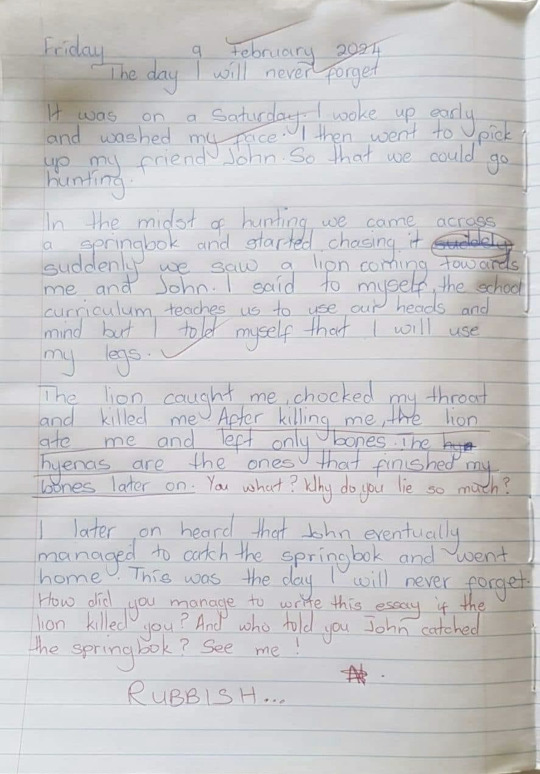#irregular verbs
Text


"Bust" = break something.
⠀
Past / Past Participle: bust (or busted)
⠀
Example: I've bust my leg three days ago.
⠀
Example: Thieves busted the lock and damaged the sliding door.
⠀
Learn irregular verbs in our app - https://onelink.to/9ssyrh
#irregular verbs#irregularverbs#english language#english#learn english#learnenglish#irregular verb#english verbs#efl#toeic#toefl#esl#vocabulary#vocab
7 notes
·
View notes
Text
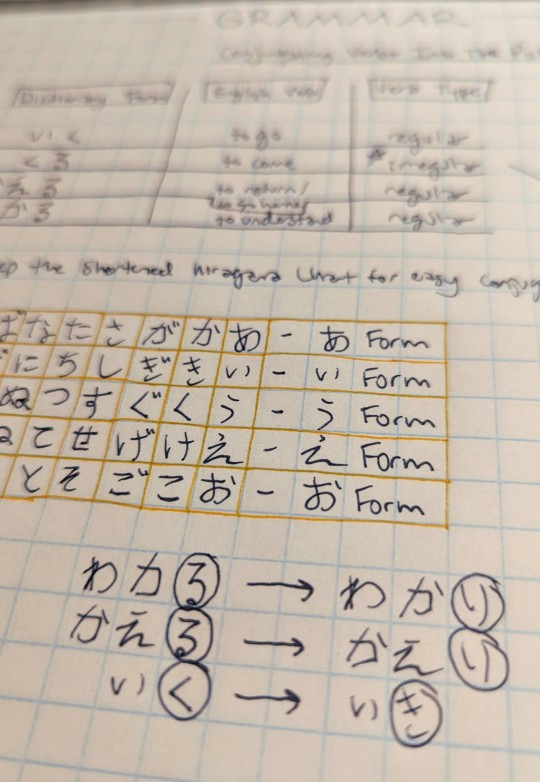
こんばんわ。
it's real shitty handwriting hours ✍️
#verb conjugation#japanese verbs#regular verbs#irregular verbs#learning japanese#study#studyblr#japanese language#nihongo#hiragana#handwritten notes#langblr#writing japanese#conjugation notes#grammar notes#Japanese grammar#Japanese language notes#japanese langblr#日本語#messy handwriting#messy notes
2 notes
·
View notes
Photo
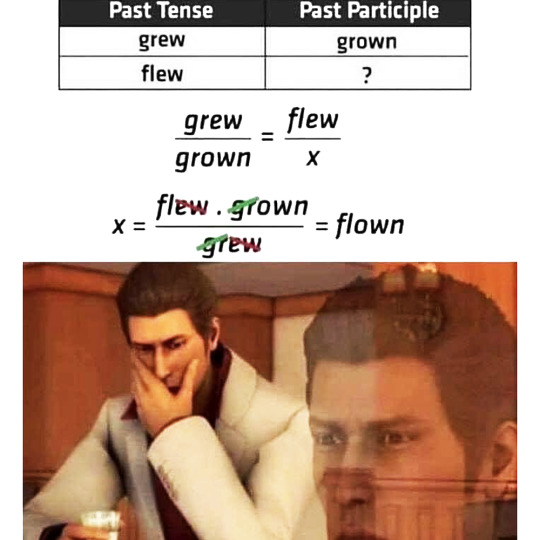
😫 Irregular verbs in English are a pain in the butt, even for native speakers.
🔗 The always excellent Purdue Online Writing Lab (OWL) 🦉 has a convenient chart of the most common irregular verbs, which you can access by using this URL: https://tinyurl.com/IrregularVerbsOWL

Website | Twitter | Instagram | Medium | Pinterest | Ko-fi | eBook
18 notes
·
View notes
Text

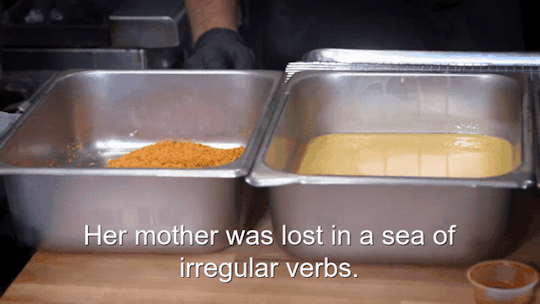

[I would always incorporate those. Her mother was lost in a sea of irregular verbs. We've got some hot sauce, kosher salt, fresh cracked pepper.]
#s34e05 off the beaten path#guy fieri#guyfieri#diners drive-ins and dives#fresh cracked pepper#irregular verbs#hot sauce#kosher salt#mother#sea
6 notes
·
View notes
Text
The verb “to come” in Telugu
వచ్చు vattsu “to come” is an irregular verb in Telugu and here I will explain all its irregularities. Examples in modern Telugu will be given, as well as the historical reasons why it is like this. The historical data will be traced back to Proto-Dravidian, with comparative data given in other Dravidian languages. The comparative data will be taken from the Dravidian etymological dictionary (DED), with extra info added as needed.
As a learner of Telugu, I assume other learners are reading this, so first I will give all the forms of vattsu in its tenses, as well as participle forms. Firstly, the conjugation of “to come” in all tenses. From left to right: past, future/ non-past, present continuous.
నేను nēnu "I" - వచ్ఛాను vacchæːnu - వస్���ాను vastānu - వస్తున్నాను vastunnānu
నువ్వు nuvvu "thou/ you" - వచ్ఛావు vacchæːvu - వస్తావు vastāvu - వస్తున్నావు vastunnāvu
వాడు vāɖu "he" - వచ్ఛాడు vacchæːɖu - వస్తాడు vastāɖu - వస్తున్నాడు vastunnāɖu
అది adi "she, it" - వచ్చింది vacchindi - వస్తుంది vastundi - వస్తున్నది vastunnadi
మేము mēmu/ మనము manamu "we" - వచ్ఛాము vacchæːmu - వస్తాము vastāmu - వస్తున్నాము vastunnāmu
మీరు mīru "you"/ వారు vāru "they" - వచ్ఛారు vacchæːru - వస్తారు vastāru - వస్తున్నారు vastunnāru
అవి avi "they" - వచ్ఛాయి vacchæːyi - వస్తాయి vastāyi - వస్తున్నాయి vastunnāyi
Negative tenses
The simple non-past negative, which can also be used for future, conjugates for all persons.
నేను nēnu "I" - రాను rānu
నువ్వు nuvvu "thou/ you" - రావు rāvu
వాడు vāɖu "he" - రాడు rāɖu
అది adi "she, it" - రాదు rādu
మేము mēmu/ మనము manamu "we" - రాము rāmu
మీరు mīru "you"/ వారు vāru "they" - రారు rāru
అవి avi "they" - రావు rāvu
The past negative is రాలేదు rālēdu "did not come" and it applies to all pronouns. Similarly, the negative continuous is రావటంలేదు rāvaʈamlēdu "is not coming".
The imperative is used when giving orders or requests. It is as follows:
రా rā (singular), రాండి~ రండి ra(a)ɳɖi (plural) “come”
negative imp. - రాకు rāku (singular), రాకంది rākaɳɖi (plural) “do not come”
“vattsu” is the dictionary form but it takes the form రా rā in some contexts. In Telugu, the root came from *var-cc-, with *-cc- being a past tense suffix (Krishnamurti, 2003, p. 298). The suffix is also attached to verbs ending in -yu in the past tense; చేశాను cēśæːnu "I did", వ్రాశాను vrāśæːnu "I wrote". Which is why the suffix does not feature in non-past tenses, like రా rā (imperative, infinitive), రాను (negative) "I will/do not come", రాలేదు rālēdu (past negative, made with infinitive +lēdu) "did not come", as they came from *var-a.
Now that the forms of the verb have been established, I will go over more of the linguistic details. Firstly, I took the entry from the DED and enhanced it with adding the scripts of each language, along with Proto-Dravidian info where found.
DED 5270 *vaH-r- "to come" > Ta. வா vā, வரு- varu-, Ma. വരിക varika, Ka. ಬರ್ bar, Te. వచ్చు vaccu, Go. waiānā, Kui vāva
This is because Telugu undergoes a rule of CVCV > CCVV, though it mainly applies when the second consonant turns to -r-. And in modern Telugu, for most words the consonant clusters are simplified so the -r- just disappears, unless it is vr- which becomes r-. More examples below:
DED 5372 "to live", *vāʐ > Ta. வாழ் vāʐ, Ma. വാഴുക vāʐuka, Ka. ಬಾಳು bāɭu, ಬದುಕು baduku, OKa. ಬೞ್ದುಂಕು baʐdunku, Te. బ్రతుకు bratuku "to live, life" (I think the Telugu word is a Kannada borrowing as v- > b- is a Kannada sound change, not Telugu)
DED 5263 *vari- > Ta. வரி vari-, வரை varai- "to draw", Te. వ్రాయు~ రాయు (v)rāyu "to write", Go. rasāna "writer", Kui vrīsa scratch, mark
DED 2149 *koʐ-V "tender, young” > Ta. கொழுந்து koʐuntu "tender twigs, leaves, shoots", கொழுமை koʐumai "beauty, fertility, plumpness", Ka. ಕೊಡ koɖa tender, Te. క్రొత్త~ కొత్త k(r)otta "new", Go. kōɽsānā to sprout, grow, Kui koɽgi newly sprouted, green, immature
Examples of VCV > CVV
DED 2559 *cil "not" > Ta. இல்லை illai "no", Ka. ಇಲ್ಲ illa "no, does not exist, there is not", Te. లే- lē "is not", లేదు lēdu "no", Go. sile, hill- "not be", Kui siɖa
DED 474 *ira-ɳʈ 2 > Ta. இரண்டு iraɳʈu, Ma. രണ്ടു raɳʈu, Ka. ಎರಡು eraɖu, Te. రెండు reɳɖu, Go. ranɖ(u), Kui rī
DED 502 *iʐi- "to descend" > Ta. இழி iʐi, Ma. ഇഴിക iʐika, Ka. ಇಳಿ iɭi, Te. ɖigu, Go. ḍigānā, Kui dīva
I added Gondi and Kui data since they are in the same branch as Telugu but so far I am inconclusive about the sound changes in them. I have not studied any Dravidian language apart from Telugu to be confident about saying things about them. Languages used:
South Dravidian
Ta. - Tamil
Ma. - Malayalam
Ka. - Kannada
South-Central Dravidian aka South Dravidian II
Te. - Telugu
Go. - Gondi
Kui
Notes
I used just “v” for the Proto-Dravidian and modern languages. It does get annoying that different books alternate v vs w, but I settled on using v. And they are supposed to make the same sound anyways, so it does not really matter.
The consonants ḻ, r̤, ẓ, which I wrote as ʐ correspond to the consonants in Tamil ழ, Malayalam ഴ, Old Kannada ೞ. Different sources write these in different ways, so I just wrote what aesthetically satisfies me.
Reference List
B. Krishnamurti. (2003). The Dravidian Languages. Cambridge University Press.
B. Krishnamurti, & J. P. L. Gwynn. (1985). A Grammar of Modern Telugu. Oxford University Press.
Burrow, T., and M. B. Emeneau. (1984). A Dravidian etymological dictionary. 2nd ed. Oxford [Oxfordshire]: Clarendon Press. https://dsal.uchicago.edu/dictionaries/burrow/.
Fabricius, Johann Philipp (1972). J. P. Fabricius's Tamil and English dictionary. 4th ed., rev.and enl. Tranquebar: Evangelical Lutheran Mission Pub. House.
N.Učida, B.B.Rajapurohit & J. Takashima. (2013). Kannada-English Etymological Dictionary. Research Institute for Languages and Cultures of Asia and Africa (ILCAA), Tokyo University of Foreign Studies.
Reconstruction:Proto-Dravidian/wāẓ. (2022, August 18). In Wiktionary. https://en.wiktionary.org/wiki/Reconstruction:Proto-Dravidian/wāẓ
ಬೞ್ದುಂಕು. (2022, July 5). In Wiktionary. https://en.wiktionary.org/wiki/ಬೞ್ದುಂಕು
7 notes
·
View notes
Text
I was trying to translate a Beyonce lyric in Na'vi with my limited vocab (💀) and got stuck on the lyric "you got me lookin ao crazy right now" because of the way I'm trying to translate "got" into "have" like this:
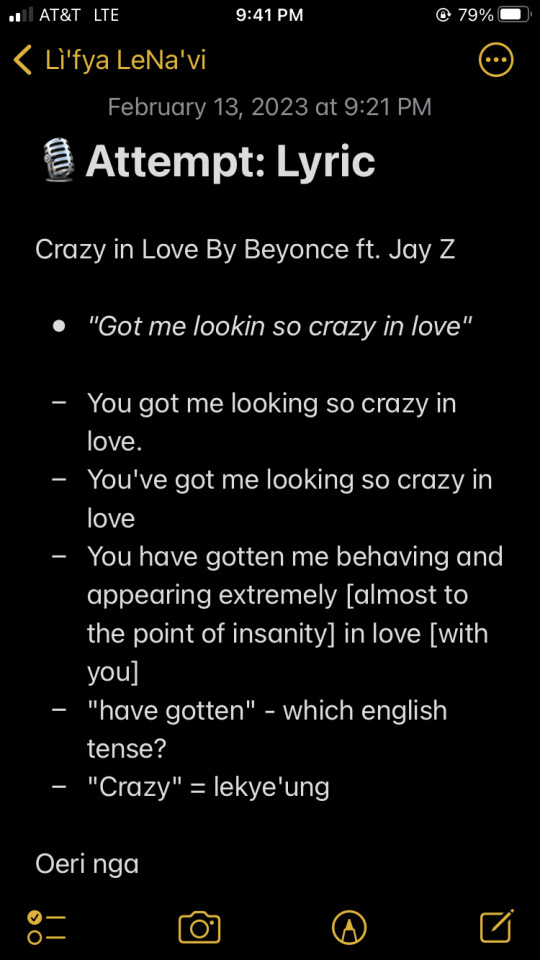
I stumbled upon a realization that I really didnt know how complex the word "have" is and how much I take it for granted in daily speech as a verb. Seeing it broken down like this makes it more complicated to answer how I should translate this lyric in Na'vi, which doesnt have a verb equivalent for "to have" and probably also doesnt have an equivalent for the colloqial phrasing of "X having Y".
"To have" is usually understood as a possession verb for subjects we understand as "having" a specific thing in their possession or fundamentally about their person (a trait, property, clothing, etc). So verb is usually understood as a general term of proximal deixis.
But I notice how it functions like the Na'vi intransitive copula lu when expressing "there is X to [subject]". Like saying "Have a good day" or "She has a cold" is like saying "there is a cold to her" or "[I hope] there will be a good day to you".
I'm rambling a bit but this is helping me get out of my stump of not knowing how to treat the word "have" in English to understand how to translate a colloquial, lyrical form of English into Na'vi. I could possibly use lu to express "you have me" or "youve gotten me" similarly to "have" in the sense of nominalizing (?) a clause to say "you have me in your possession" in a metephorical way. But thats not what "have" or "have gotten" feels like in the way its used English in the lyric. I cant quite articulate what it means because it simply feels right, but I know its not really about metaphorical, literal possession (💀) as much as its about someone being the influencing force for you to behave like something. I'm tryinf to shorten it in Na'vi but working around the intransivity of lu and a limited vocab is tricky for me. 😅
#this is british english kedkkxjx but its stll practically the same#linguistics#my speech#verbs#irregular verbs
3 notes
·
View notes
Text
I know I'm reaching peak adult and turning into a head shaking old fuddy duddy, because every time I read the words "sneaked" or "leaped", instead of "snuck" and "leapt", in a more recent publication my eye starts twitching.
I get that irregular verbs are a particularly sharp thorn on the English rose of insanity, but if I ever see "drinked" brought in to replace "drank", I will become a Bond villain istfg
5 notes
·
View notes
Text
"W-what did you do..." He looks before the nothingness, with his face filled with fear, with everything but nothingness.
Voice cracking, throat sore, eyes but a shadowy void. He forces him to exclaim such words
"What I did was for the best for us, everyone here!"
"Stop lying! I'm going to ask you one last time what have you done!"
_________________________________
Part 2 of posting dialogue prompts using the base form, past tense, and participle of irregular verbs
#writing#writers on tumblr#writing prompt#dialogue ideas#idk lmao#random dialogue#writing dialogue#overdramatic#idk what to tag this as#brainrot#irregular verbs#verbs
3 notes
·
View notes
Text
Emotive conjugation
It is often called Russell's conjugation in honour of philosopher Bertrand Russell, who expounded the concept in 1948 on the BBC Radio programme The Brains Trust, citing the examples:
I am firm, you are obstinate, he is a pig-headed fool.
I am righteously indignant, you are annoyed, he is making a fuss over nothing.
I have reconsidered the matter, you have changed your mind, he has gone back on his word.
The inherent incongruity also lends itself to humor, as employed by Bernard Woolley in the BBC television series Yes, Minister and Yes, Prime Minister:
It's one of those irregular verbs, isn't it?
I have an independent mind, You are eccentric, He is round the twist.
I give confidential press briefings; you leak; he's being charged under section 2A of the Official Secrets Act
6 notes
·
View notes
Text


"Presell" = sell something before it is available.
⠀
Past / Past Participle: presold / presold
⠀
Example: Some digital products are presold to customers a week or two before the release date.
⠀
Learn irregular verbs in our app - https://onelink.to/9ssyrh
#irregular verbs#irregularverbs#english language#english#learn english#learnenglish#irregular verb#english verbs#efl#toeic#esl#toefl
9 notes
·
View notes
Text
Je suis
Tu es
Il/Elle/On est
Nous sommes
Vous êtes
Ils/Elles sont
2 notes
·
View notes
Photo

YOU CAN DOWNLOAD THIS LIST IN PDF FORMAT HERE : https://www.aprendeinglesenleganes.com/verbs-that-stay-the-same.php
In the English language, most irregular verbs change form in the past and the past participle. Yet there are some irregular verbs that do not change at all like cut, cut, cut or cost, cost cost. The list below contains 30 such verbs.
#b2 first#c1 advanced#c2 proficiency#cambridge english#use of english part 4#english grammar#advanced english#TOEIC#TOEFL#IELTS#esl#irregular verbs#ingles#inglese#english#anglais#englisch
3 notes
·
View notes
Text
past participle of irregular verbs // participe passé des verbes irréguliers
avoir -> eu
pouvoir -> pu
vouloir -> voulu
devoir -> dû
naître -> né(e)
mourir -> mort(e)
devenir -> devenu(e)
prendre -> pris
(re)venir -> (re)venu(e)
descendre -> descendu
se taire -> se tu(e)
asseoir -> assis
prévoir -> prévu
5 notes
·
View notes
Text
11 USEFUL VERBS in IRISH language + PRONOUNS 🇮🇪 | Irregular Irish verbs in Future Tense
youtube
#irish#gaeilge#grammar#gramadach#vocabulary#foclóir#verbs#briathra#irregular verbs#future tense#aimsir fháistineach#gaeilge i mo chroí#videos#Youtube
4 notes
·
View notes
Text
Exploring Spanish Verbs and their Cultural Significance
The Heartbeat of Spanish
Like the steady rhythm of a heartbeat, delving into Spanish verbs reveals the pulse of fluent communication. Just as in English, verbs propel action and convey meaning, yet exploring Spanish verbs leads us into a rich linguistic terrain where each beat carries nuanced shades of expression, diverging from their English counterparts.
Learning these verbs is like tuning…

View On WordPress
#Conjugation#Cultural differences#education#English#english-language#english-learning#Hispanic heritage#inglés#Irregular verbs#language#Language and culture#Language evolution#Language exploration#Language Learning#Language nuances#Language roots#language-learning#languages#learn-english#learning#Linguistic journey#Ser vs. Estar#Spanish culture#Spanish verbs#Verb conjugation
0 notes
